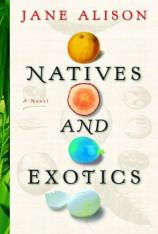Reading Group Guide
Discussion Questions
Natives and Exotics

1. The book's prologue mentions renowned figures Captain Cook, Sir Joseph Banks, and Alexander von Humboldt. Do they share a common motivation in exploring new worlds? By contemporary standards, do they share any heroic qualities? Do they share any traits with Rosalind and Hal?
2. In the first chapter, we learn that Ecuador is Alice's fourth country, and that at age nine she is about to inhabit her sixth city and seventh house. What does her arrival in Braniff signal in her life? What does the sudden presence of other ruling-class foreign families signal to the Ecuadorians?
3. Is the military coup witnessed by the Forder family mirrored in other sections of the novel? How were previous power struggles resolved by political leaders, outsiders, the military, and rank-and-file inhabitants of the book's various locales?
4. How do Alice and the other schoolchildren understand and define the world around them? What is the intention of their secret slumber-party game? Do the novel's children have a more accurate grasp of nature than their parents do?
5. What is the effect of Part One's ending with Alice's illness and recovery? In what way does that serve as a bridge to the images of her grandmother Violet battling exhaustion in Australia?
6. What is the significance of the prehistoric discoveries mentioned in the novel? What does it mean to the primary characters to discover the demise of a population of dinosaurs, or the reality that continents drift?
7. Discuss the roots Violet and her husband must extract in order to create pastoral land. Will their "roots" be stronger than the ones of the foliage they want to vanquish?
8. Mr. Clarence and George give voice to the colonists who were driven from their homelands and sought security more than conquest in South America. In the face of crops disfigured by experimentation and blight, and an earthquake that disfigures the landscape, George chooses the extreme terrain of Australia for his safe haven. The opening paragraphs of chapter 14 indicate that he is seeking an antidote to the Coceus parasite. George also thinks, "maybe on that lonely, ancient continent, partly paradise but in larger part hell, he would at last find his habitat." Why might it sometimes be difficult for human beings to find a suitable habitat?
9. The novel mentions gruesome acts of violence that occurred in the process of eradicating native peoples during colonization. Is sadism an essential component in conquest?
10. In the novel, land is despoiled while the plunderers anticipate huge financial rewards. Is financial gain always at odds with environmental preservation?
11. The novel illustrates humanity's fascination with exoticism, and the intrinsic value in cargo brought far from its origins. But Violet's three-month sojourn (during which she tires of shopping) also illustrates how much more accessible international travel has become. Has globalization made us less awed by imported goods? Is the notion of exoticism on the wane? Does colonization now take place on the scale of individual consumers?
12. What is the effect of Jane Alison's choice of locales in Natives and Exotics? How might the narrative have changed if the Middle or Far East had been chosen instead? What is significant about the globe's southern hemisphere?
13. Does the storytelling tone change among the novel's four parts, or does the voice remain the same throughout? What descriptive elements remain constant no matter where the scenes are set?
14. Discuss the novel's final chapters: Violet survives rough seas and returns to her orderly life with a renewed sense of home (albeit a lonely one without her husband); Alice observes a whale and transplanted palm trees in the North Atlantic, then closes the book with a song that mentions satellites-the next frontier for exploration. How do each of these generations define "native"? Do grandmother and granddaughter both feel restored in the end?
15. What legacies of colonization or immigration are woven into your family history? Where do you feel most firmly planted?
Natives and Exotics
- Publication Date: May 9, 2005
- Hardcover: 256 pages
- Publisher: Houghton Mifflin Harcourt
- ISBN-10: 0151012016
- ISBN-13: 9780151012015







